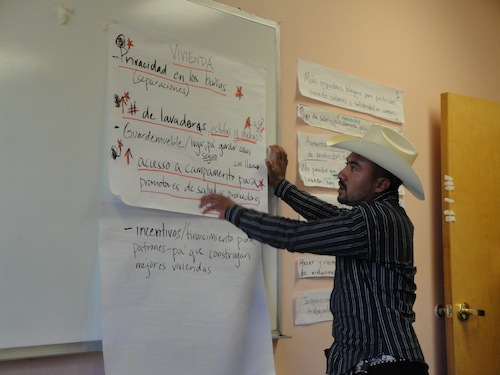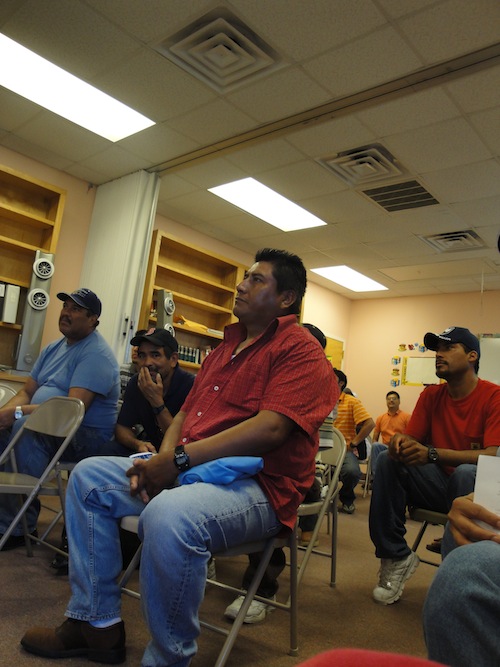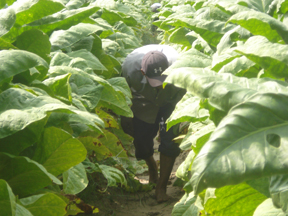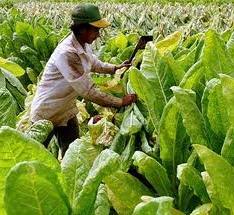The Birth of North Carolina’s Food: farmhands at work
By Erin Krauss
Many of us think of the USA as an industrialized and professionalized country, worlds away from dependence on the land. But the food we eat, whether fresh or highly processed, at one point came directly from the soil. It is easy to forget who works the soil to make food grow. In elementary school, all of us learned about the Food Chain – who consumes what and what it takes to keep things balanced. In light of Thanksgiving season this year, I propose that we all revisit this idea of the Food Chain. But instead of just thinking about what we eat on a daily basis, let us think about where it comes from. How is food planted, tended to, picked and shipped to our stores? Whose hands do this work? Have we ever shaken one of them or thanked one of them? Finally, what would we do these hands were no longer here to pick the food that nourishes our state’s people?
Where does North Carolina’s food come from? It comes from the 150,000 farm hands that tend to our soil – about 8,000 of whom are contracted and brought here on Agriculture Visas (H2A Visas). The other 142,000 are estimated to be undocumented immigrants. All of these people are needed to work the land to produce the food that NC demands. These people plant, tend and pick sweet potatoes, peppers, cucumbers, cabbage, tomatoes, blueberries and strawberries - NC’s top agro-crops. This job is not an easy one. Does everyone remember how hot it was this summer? Cities across NC set record high temperatures over 100 degrees. Can you imagine harvesting vegetables in 100-degree heat, carrying 2 tons of sweet potatoes on your back? This is the way that farm workers in NC make a buck. Two tons equals 4,000 pounds, which is the equivalent to the weight of your average car. Carrying a car on your back will earn $50 if you are a farm worker. (I earn $50 within four hours, sitting at a desk job at UNC.) This job is not one done only by strapping young men in perfect health; to the contrary, a number of people in the fields are women, middle-aged folks, and youth. According to the US Department of Labor, nationwide, in 2006, around 1.2 million children under the age of 20 resided on farms – many worked in the fields. Not only this, but did you know that the places farm workers live are called “Labor Camps”? Yes, you heard that right, Labor Camps. Reminiscent of times in history we’d rather let reside in the past, right? But oddly enough, these “Camps” still exist with many of the same conditions that people lived endured in the mid-20th Century. I’m not referring to sparseness; I’m talking about deplorable conditions. Bathrooms with no separation between the stalls for basic privacy; people washing their pesticide soaked clothes in buckets; no access to kitchen space to cook food; cockroach infested, tight spaces with 20, 30, 40 people in one-room buildings; and no landline phone provided for possible emergencies. This is what is really happening in the NC food chain: unhealthy working conditions, unliveable living conditions, and total naivety among the NC population regarding where the food comes from that nourishes our bodies and keeps us alive.
This Thanksgiving let us be conscious of what we know to be true about North Carolina: first, that it is a beautiful state and one that we are proud to live in. Second, that our neighbors, the farm workers, the people we depend on to feed us, are mistreated, hidden from the public, and neglected by employers and many legislators. The very people that feed us, half the time, are unable to feed their own families due to extreme levels of poverty. One in four of these people report being injured on the job – the job we ask them to do because we don’t want to do it. And these people’s voices are kept silent. Most US Citizens will not do the backbreaking work it takes to keep our stores stocked with an overabundance of food. But what we need to do as US citizens is speak up. We have the voting, constituent power to make a difference, speak out in our communities, and to talk to our legislators.
This Thanksgiving I invite my neighbors, residents of the Triangle area, to make a daily effort to think about food. Where does it come from, how many hands touched it before it arrived on your plate? Who planted it, made it grow, harvested it, and processed it? I invite you to talk about food with your children, loved ones, friends, and co-workers. I invite you to hold an event at your church, at your home, at your school – a dinner, a film screening, or a discussion. And finally, I urge you to speak up to your representatives – and tell them that you support legislation that will ensure safe living and working conditions for farm workers and will demand the enforcement of current protections that exist for people who harvest our food.
This fall, the Farm worker Advocacy Network is launching a new legislative and community engagement campaign to support farm workers. If you want to be involved in any way, shape, or form, call to find out about how you can help. Farmworker Advocacy Network (919) 861-2064; ask for Erin Krauss.
 Monday, November 22, 2010 at 11:15AM by
Monday, November 22, 2010 at 11:15AM by  Bart Evans
Bart Evans 












